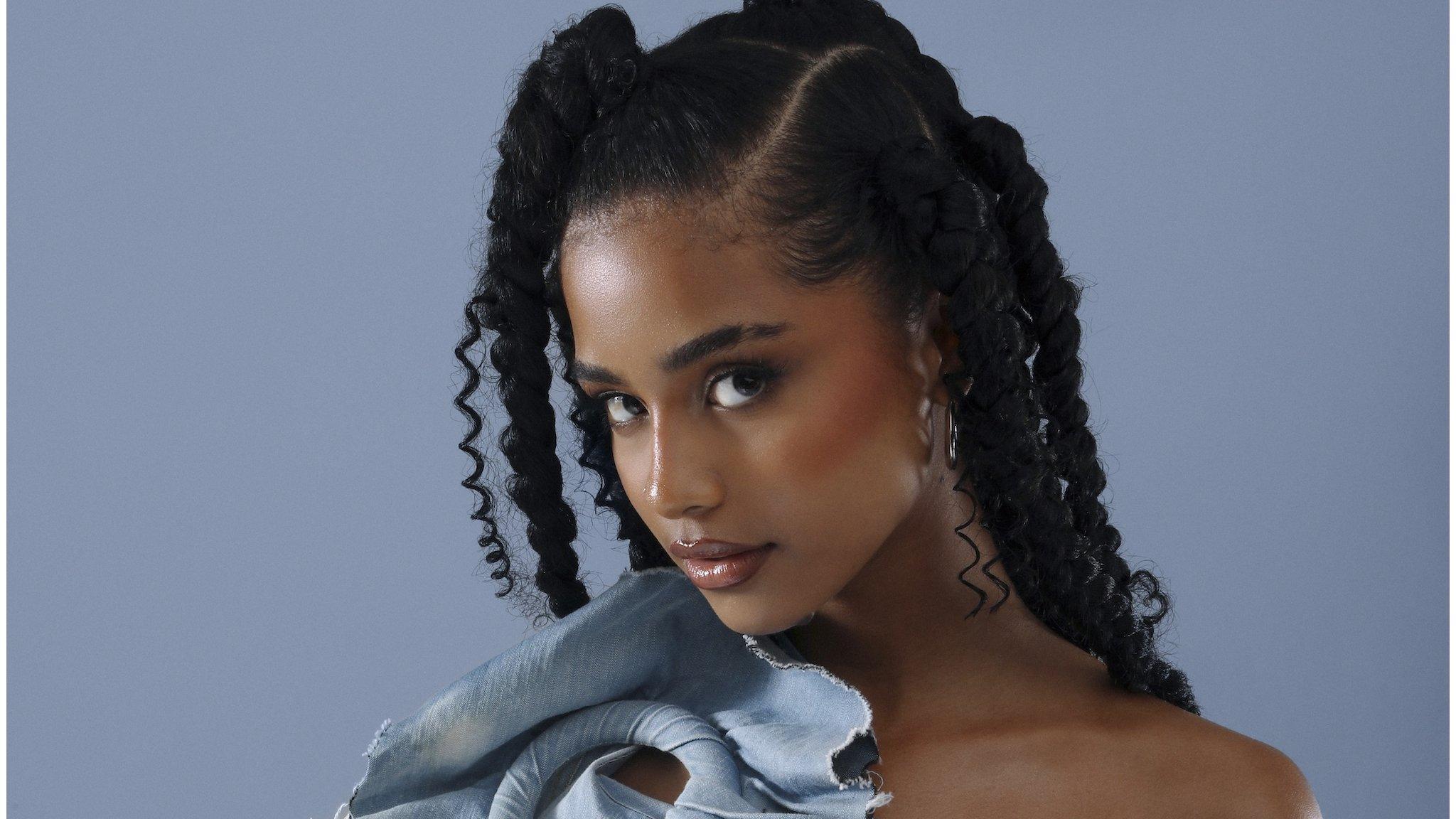BBC Sound Of 2024: Superstar DJ Peggy Gou breaks out of the dance bubble
- Published
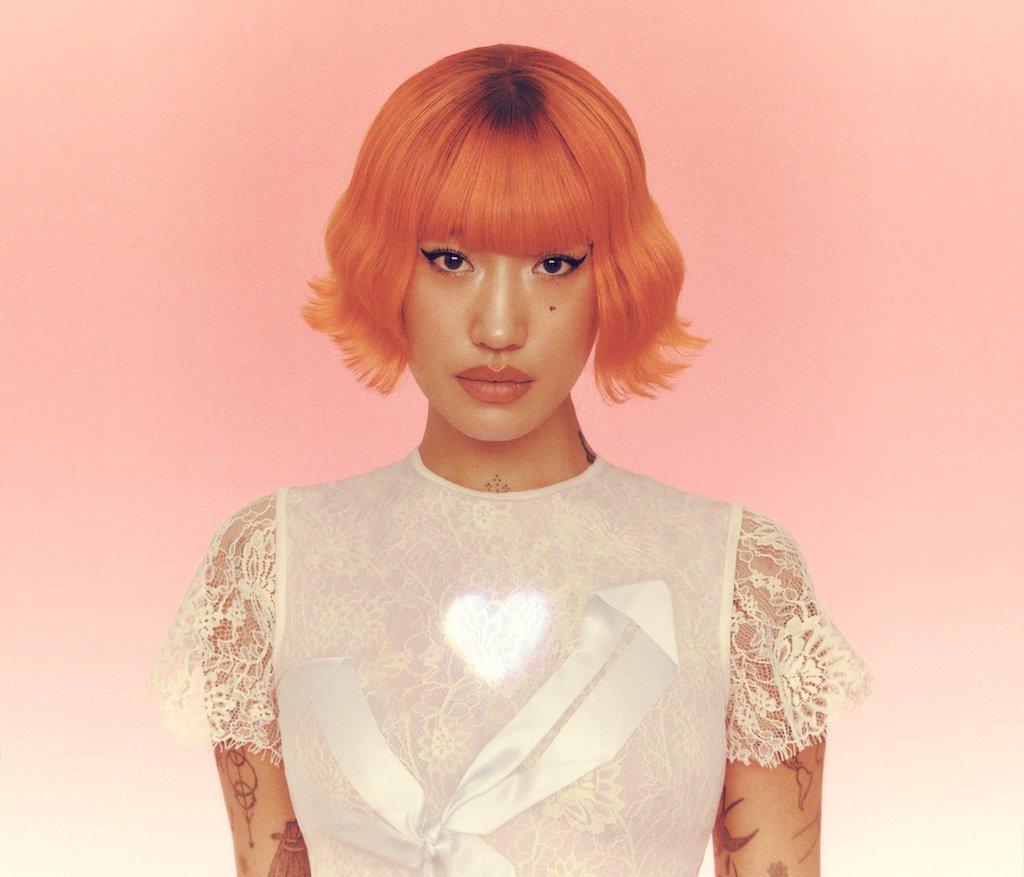
Peggy Gou has been a huge star on the house music scene for the last decade
People who know house music know exactly who Peggy Gou is.
The Korean-born, Berlin-based DJ has been a mainstay of the club scene for years. But last summer, she had a mainstream breakthrough with the pinging, percussive pop banger It Goes Like (Nanana).
"Even though I've been releasing music since 2015, last year really hit differently," she says.
"I did not expect this song was going to get so much love, but it really changed a lot of things for me."
Since the song hit the charts, she's graced the cover of Vogue, external magazine, been named the best house DJ in the world, external and linked up with Lenny Kravitz, external,
On top of that, she's just been voted into third place on BBC Radio 1's Sound Of 2024, which aims to predict the biggest crossover stars of the next 12 months.
"I can't believe it," she says on a Zoom call from Dubai. "I want to say thanks to everyone who voted for me!"
In some respects, her place on the list is a surprise. Since it started in 2003, the Sound Of poll has championed newcomers - from the initial winner, 50 Cent, to the likes of Franz Ferdinand, Adele, James Blake, Stormzy and PinkPantheress.
No other nominee has ever been eight years into their career, but there's a sense that Gou's poised to break out of the dance bubble.
It's a change she's noticed herself. "Before, people knew about me before they knew my music. But after Nanana, I felt like people heard the music without knowing what I even look like. That's the big difference."
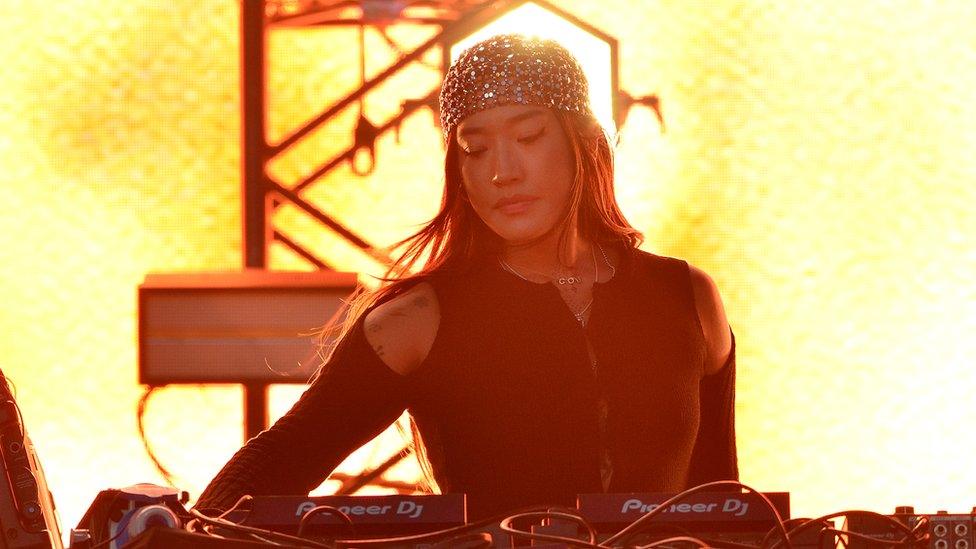
The musician's live sets draw huge crowds - who have developed an interesting symbol of their devotion
The music speaks for itself. Bright, melodic and danceable, it has obvious mass appeal.
In the words of legendary producer Todd Terry, her interpretation of house is not just a style of music but a feeling in itself.
"I want to give people a really good energy," she says. "After 50 years, I want people to say, 'Do you remember that song? Do you remember that moment?' and talk about the memories and the feelings they had when they heard it for the first time."

BBC Radio 1's Sound Of 2024
Fifth place: Soul sensation Elmiene
Fourth place: South African pop phenomenon Tyla
Third place: Superstar DJ Peggy Gou
Second place: 'Imperfect' pop singer Olivia Dean
First place: Indie's hottest band, The Last Dinner Party

Peggy Gou was born Kim Min-ji in 1991, and raised in South Korea's chief seaport, Incheon.
The first music she loved was K-pop - not the modern, mechanical sounds of Stray Kids or BTS, but the 80s idols like Kim Wan-sun and Uhm Jung-hwa (aka "the Korean Madonna").
"If I listen back to it now, it's still good," she says. "It has a sexy feeling and a happy feeling to it."
But her real musical education began when she turned 14 and her parents sent her to London to study English.
"It was quite a brave thing to do, if I think about it. I didn't speak any English. I used to carry dictionaries around with me all the time."
As a minor, she spent three years living with guardians, but she took a casual approach to the rules - obtaining a fake ID and spending her weekends clubbing around the capital.
"I don't know if you know Croydon, but I lived in Croydon," she laughs. "I was a little savage ghetto girl!"
She moved back to Korea when she was 18, but instantly found home to be stifling. Within six months, she'd enrolled in the London College of Fashion and returned to the UK.
"I couldn't keep up with the studying in Korea, if I'm honest," she says, "but I also felt like I belonged [in the UK].
"I was more open-minded and Korea at that time, for me, it was too conservative."
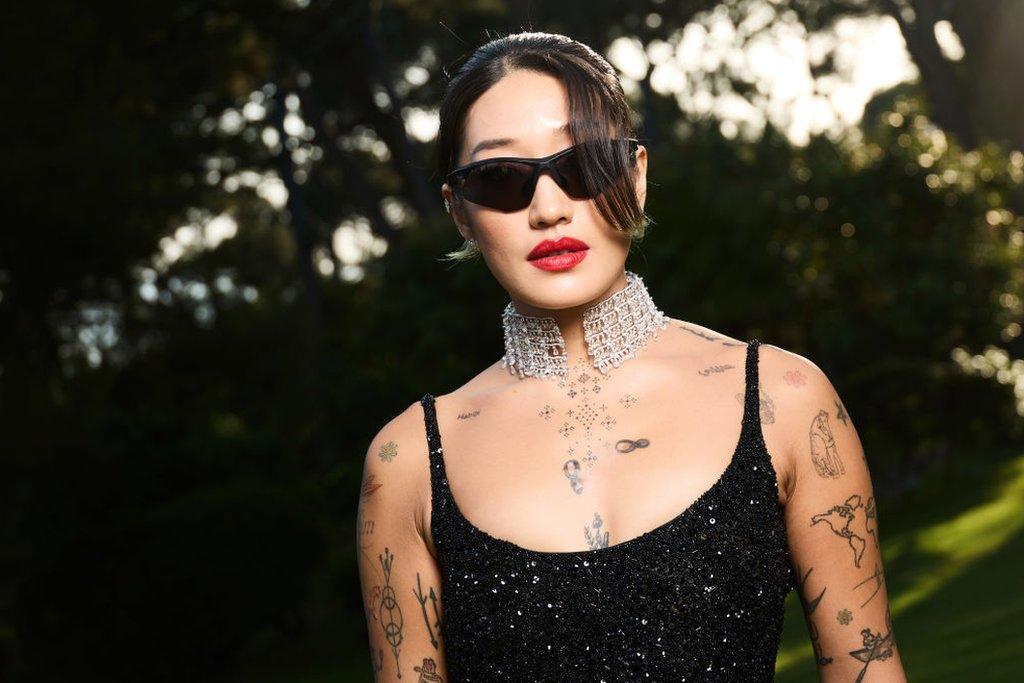
A former fashion writer with her own clothing line, Gou is often seen at fashion week events in London and Milan
Studying took second place to nightlife. She went out dancing six times a week, at hip-hop nights and underground clubs. In 2011, she discovered deep house and fell in love with its vibey, R&B-infused sound.
By that point, she'd already learned the basics of beat-matching from a friend, and when the DJ pulled out of a Korean society event at her university, Gou offered to step in.
"I messed up a lot of things in that show, but I still made people dance.
"I was like, 'Wow, this is amazing. I love this feeling.'"
Word began to spread. Gou was booked to play at other University events, then scored a weekly residency at east London's Book Club.
Unsurprisingly, she failed her fashion course, but she picked up work at Harper's Bazaar and, in 2016, moved to Germany.
There she had one aim: To be the first Korean woman to play Berghain, Berlin's most exclusive nightclub.
Within a year, she'd achieved it.

The star's debut album is scheduled for release in the first half of 2024
By that point, Gou was dropping original songs into her DJ sets - but only after four years of writing and rejecting her own material.
Her first demos were "70% samples", she says, mixing club beats with traditional Korean instruments, but "every song sounded the same" (for completists, she later released one of those early tracks, Hungboo, external, on her DJ-Kicks compilation).
In 2016, she released four EPs of supple-but-lethal house tunes. But it was only when she went for a more stripped-back, vocal-led approach that things started to come together.
Her calling card was It Makes You Forget (Itgehane), the sound of sunrise set to music - all swirling synths and gently bubbling acid bass, over a skipping house beat.
An ode to club culture and the restorative power of escapism, it also marked Gou's first attempt at singing.
"That was my brave challenge. I was singing in Korean, which I thought wasn't such a cool thing in the beginning," she says.
"I did try it in English and Spanish, also. But then I was like, 'You know what, I'm Korean. I should sing in Korean!'"
For Westerners used to the staccato, rap-infused cadences of K-Pop, Gou's diaphanous vocals may come as a surprise, but she explains the Korean language has many colours.
"With K-pop, as soon as it's out, it has to hit number one - meaning it's all about how addictive the song is, how catchy it is.
"In my songs the lyrics are very poetic, so I care about how the words sound. Does the line finish with an "ay," an "ah", or an "oh"?
"My vocal trainer always says I have a breathy voice, so the way I sing is not so staccato."
Peggy Who? Peggy Shoe!
It Makes You Forget (Itgehane) became a huge anthem in the summer of 2018; and Gou's schedule grew even busier, with gigs in Brazil, Australia, Italy, Paris, France and Japan.
But it was a set at Glastonbury that really stood out.
"I didn't even know what Glastonbury was, I was so naive," she says.
"But when I started playing, people took their shoes off, external, held them in the air and started shouting, 'Peggy Who? Peggy Shoe!'"
"I still don't really know why - but in Australia, when people take their shoes off, it means you're playing a banger."
The success was thrilling and welcome, but the demanding lifestyle of an international DJ began to take its toll.
When she travels, Gou takes notes of how she feels as a sort of aide-memoire. But in 2019, after catching a glimpse of herself in the mirror of an airport toilet, she simply wrote: "I look exhausted".
It was only when Covid hit that she had time to pause.
"I had to stop because there were no shows," she says, "and I spent a lot of that time digging out 90s music and 80s music.
"I don't know why but music from that period really encouraged me during that difficult time. Simple, catchy, classy, repetitive but never boring."
Inspired, she spun her exhausted-in-an-airport story into a song, using the uplifting innocence of 90s dance music to give her motivation when life seemed overwhelming.
"'I Go' is such a great phrase because, obviously, it means 'I'll keep moving' in English, but it's also a sound that older people in Korea make whenever they're suffering from pain or they're tired.
"I thought it was perfect. I like to find the word in Korean that makes sense in English, too."
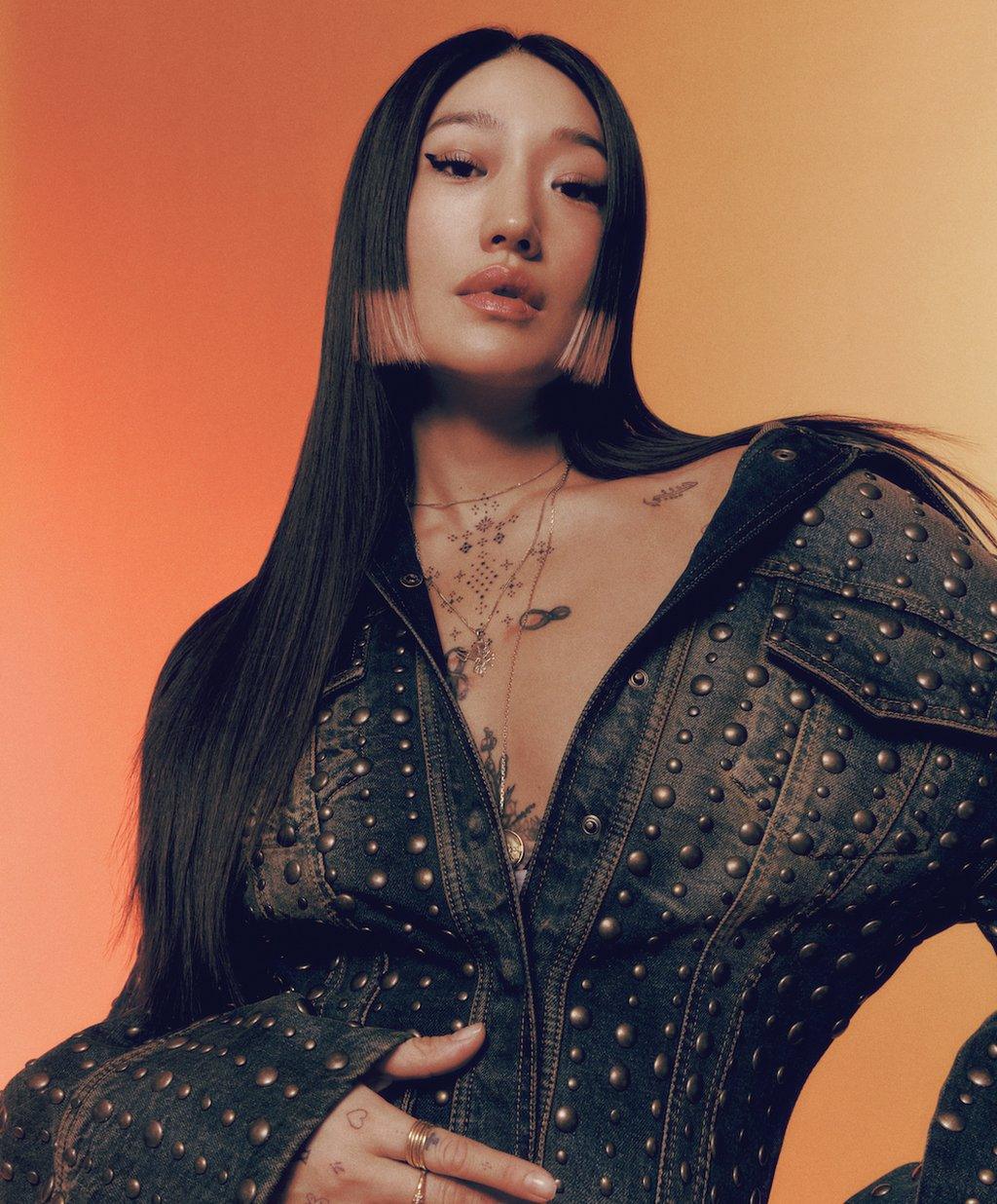
Gou's top songs include It Goes Like (Nanana), Starry Night, Six O Six and It Makes You Forget (Itgehane)
Unsurprisingly, Gou admits to being a perfectionist. She won't release a song until she's 100% happy - which is perhaps why it's taken eight years for her to prepare her debut album.
Scheduled for release this year, it will feature It Goes Like (Nanana) and her current single, I Believe In Love Again - a collaboration with Lenny Kravitz.
The rest of her album, including the title, is currently under wraps, but Gou promises "it's not just dance music".
"You can expect certain things that are different than I've ever done".
And as she takes centre stage, she hints that her in-demand DJ sets might soon be accompanied by more traditional concert performances.
"Why not?" she smiles cryptically. "I think that's everyone's dream."
Related topics
- Published1 January 2024

- Published2 January 2024

- Published4 December 2023
